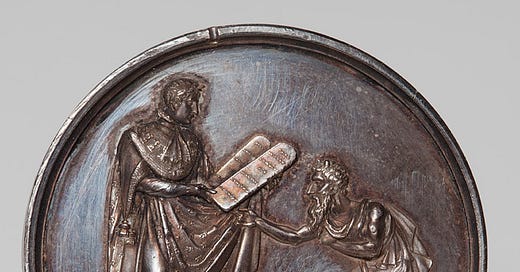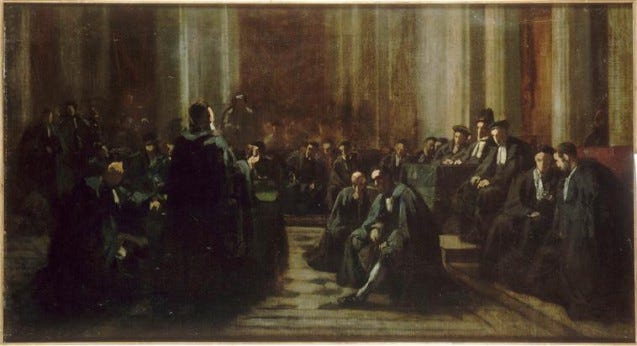Towards the end of 1806, Napoleon was sojourning in the town of Posen. He had just decisively knocked Prussia out of the war of the Fourth Coalition, 19 days after his invasion. He was tending to affairs and declared the Continental System in the Berlin Decree. While all of this was going on, Napoleon still had the time and attention required to entirely solve the issues regarding the Jewish population in France. He wrote to his Interior Minister a few principles and propositions to carry out his will. It is a display of genius, magnanimity, and his capacity as legislator and founder of a People.
Posen, November 29, 1806
Mr. Champagny, I approve that you make the contribution on the Jews of the departments enforceable, to compensate the rabbis and members of the Paris assembly. In return for this compensation, my intention is that they remain in Paris and that the Sanhedrin is convened as soon as possible. As for the project of organizing the Jewish nation, the Sanhedrin must be assembled. Summon it for a time such that I can send them back everything that needs to be settled there. Everything that is intolerant must be removed from the laws of Moses; declare a portion of these civil and political laws, and leave religious only what relates to morality and the duties of French citizens.
I - NOTE RELATING TO THE SANHEDRIN
To walk a straight path, one should begin by declaring that there are religious provisions and political provisions in the laws of Moses; that religious provisions are immutable, but that the same is not true of political provisions, which are subject to modification; that it is the Great Sanhedrin which alone can establish this distinction; that, during all the time that the Jews remained in Palestine and formed a body of nation, the political circumstances being the same as in the time of Moses, the Great Sanhedrin was not in a position of making this distinction; that, since the Israelites left their fatherland, there has not been a Great Sanhedrin. After the declaration of these principles will come the application.
1- Polygamy was permitted; it must cease to be applicable to Jews who are widespread in the West, while it can still be applied to those of the East, taking into consideration the particular situation in which they find themselves.
2- According to the law of Moses, the Jews only regarded as their brothers those who professed the same religion. This must have been when the Jewish people were surrounded by idolatrous peoples who had sworn a common hatred to the children of Israel; this can cease to be when this situation has changed, and this is what the Sanhedrin will establish by deciding that all men must be considered brothers, whatever religion they profess, if they are not idolaters and if the Israelites enjoy among them the same rights as themselves.
3- This fraternity being established, it must result in the obligation to defend the country where the Israelites enjoy the same rights as other citizens, just as, according to the law of Moses, they must defend the temple of Jerusalem: the Sanhedrin must make it a positive law.
4- From the doctrine which establishes that Jews must consider Christians as brothers, it will result not only that marriages between Jews and Christians are not anathema, but rather the necessity of recommending them, because they are important to the salvation of the nation.
5- and 6- Repudiation and marriage must be subject to prior observation of the formalities prescribed by the Napoleonic Code.
7- and 8- The explanations on the loan at interest, approximately as they are established in the project [the Napoleonic Code], also derive from the recognized fraternity.
9 - Useful professions. Add to the provisions of the proposed decision an invitation to become owners.
10- Finally an obligation of property. All these decisions belong to the Great Sanhedrin, and it is only this dogmatic part that the work prescribed by the minister makes mention of.
II -
Organizational and disciplinary measures must also be taken, and they appear to belong to the jurisdiction of the general assembly. Therefore the general assembly will determine:
1- The organization of Sanhedrins or administrative consistories by district and by department, and that of a central consistory or Sanhedrin, and the attributions of these institutions which must exercise severe policing over the rabbis;
2- The number of rabbis, the manner in which they will be paid, their obligations and their attributions;
3- The conditions necessary to be authorized to conduct commercial activities, and the manner in which this authorization will be given, under the approval of the local authority;
4- The prohibition of any kind of commerce, of the right to draw bills of exchange, of the exercise of second-hand goods, of the faculty of having a store to any individual who is not provided with the above authorization;
5- The prohibition for ten years, to all Israelites who do not prove that they own real estate in France, from the faculty of lending on mortgage, and the authorization to the owners of funds, by limiting the faculty of taking mortgage to an amount equal to the value of the fund they own;
6- The obligation, in each department or district of Sanhedrin or consistory, to authorize, out of three marriages, only two marriages between Jews and Jews, and one half-way marriage between Jew and Christian; if this provision seems too difficult to execute, it is necessary to take measures of invitation, instruction, encouragement, command which can lead to this goal;
7- The obligation to provide a quantity of conscripts proportionate to the Israelite population, without there being any replacement of an Israelite other than by an Israelite.
Other provisions could be prescribed; but they will come later.
III -
Among those established above, there are several which are not only disciplinary, but also legislative, and for which the assistance of the Council of State is necessary. Thus the Great Sanhedrin would explain the political provisions of the law of Moses, would prescribe as dogma the objects which are within its jurisdiction. The general assembly of the Israelites, making a sort of agreement with the administration, and in consideration of the advantages that the Revolution granted to Jews, would prescribe the provisions of organization and discipline. Finally, the Council of State would make the necessary regulations for the execution of the provisions and prohibitions indicated above.
In all this there is a mixture of dogmas, discipline, legislation, from which results the necessity of a Great Sanhedrin, a general assembly of the Israelites and a mutual assistance of public authority.
It takes a lot of reflection and discernment to distinguish precisely what should belong in this plan to the Great Sanhedrin, to the general assembly and to the Council of State.
If a senatus-consultus were necessary, there would be no difficulty; but it would not be possible to proceed by means of a law, given that it is a question of arriving at political results through civil provisions.
IV -
The main goal that we have proposed was to protect the Jewish people, to come to the aid of the countryside and to save several departments from the opprobrium of finding themselves vassals of the Jews; because it is a real vassalage that the mortgage of a large part of the lands of a department to a people who, by their morals and their laws, formed a particular nation within the French nation. This is how, at a very close time, with the Mortmain threatening to seize the territory, we were obliged to oppose obstacles to its progress. Likewise, the suzerainty of the Jews constantly extending by means of usury and mortgages, it became essential to set limits to it. The second object is to attenuate, if not destroy, the tendency of the Jewish people to so many practices contrary to civilization and the good order of society in all countries of the world.
Evil must be stopped by preventing it; it must be prevented by changing the Jews.
All of the proposed measures must lead to these two results. When out of three marriages there is one between a Jew and a Frenchman, the blood of the Jews will cease to have a particular character.
When we prevent them from indulging exclusively in usury and second-hand sales, they will become accustomed to practicing trades, the tendency to usury will disappear.
When we demand that part of the youth go to the armies, they will cease to have Jewish interests and feelings; they will take on French interests and feelings.
When they are subjected to civil laws, they will only have dogmas left, as Jews, and they will leave this state where religion is the only civil law, as exists among Muslims, and has always been the case in the childhood of nations. It is in vain to say that they are only degraded because they are upset: in Poland, where they are needed to replace the middle class of society, where they are respected and powerful, they are no less vile, unclean, and given to all practices of the lowest improbity.
Speculators would no doubt propose to limit themselves to introducing improvements in their legislation; but that would be insufficient. Good happens slowly, and a mass of bad blood only improves with time. However, the people are suffering, they are crying, and His Majesty's intention is to come to their aid.
Two means must be used concurrently, one of which is to stop the fire and the other to extinguish it.
Hence the need to use at the same time the Great Sanhedrin, the general assembly of the Jews, and the regulatory provisions deliberated by the Council of State.
The Great Sanhedrin has on its side the wishes and opinions of all the enlightened among the Jews of Europe. With this support he is the master of removing from the legislation of Moses those laws which are atrocious and those which only belong to the situation of the Jews in Palestine.
Napoleon





